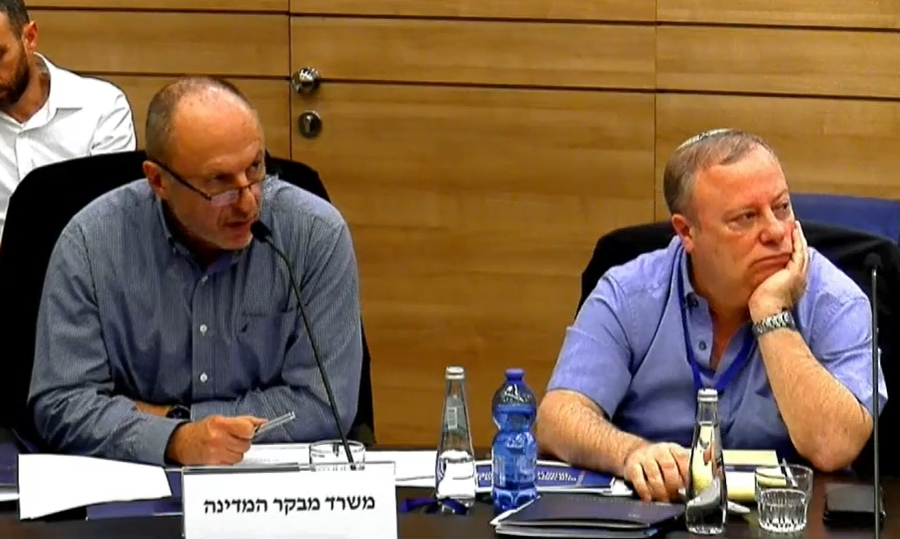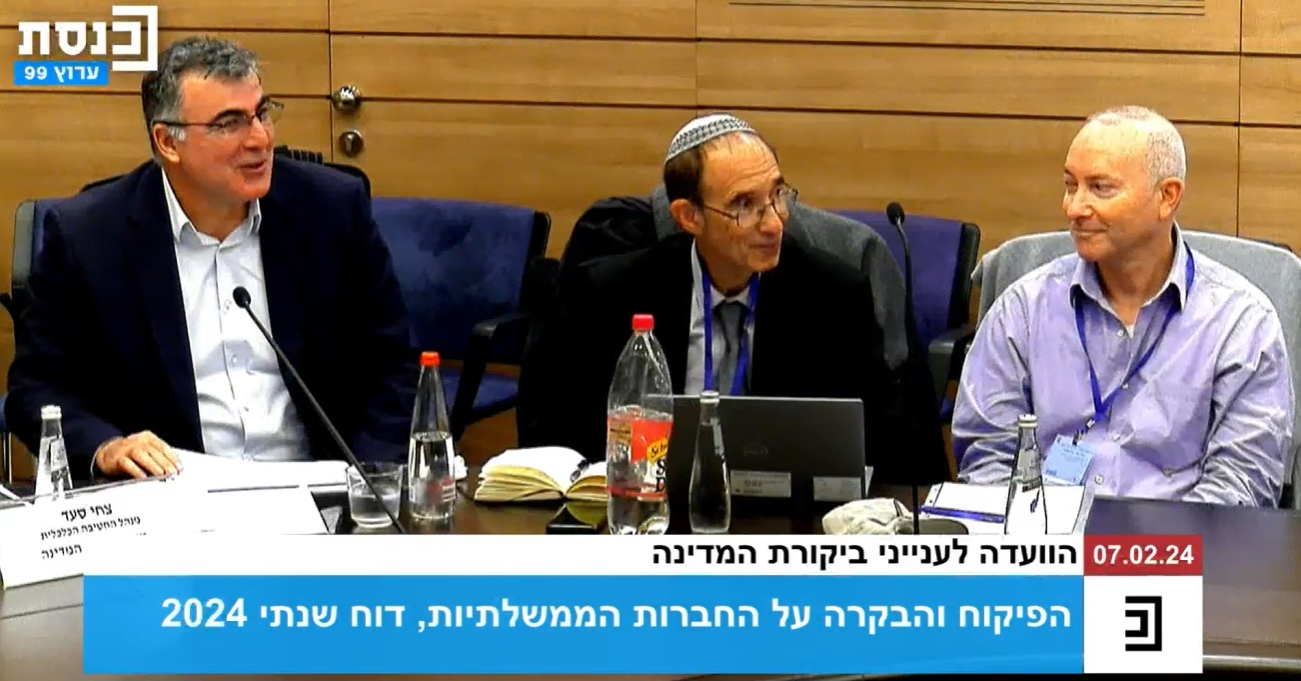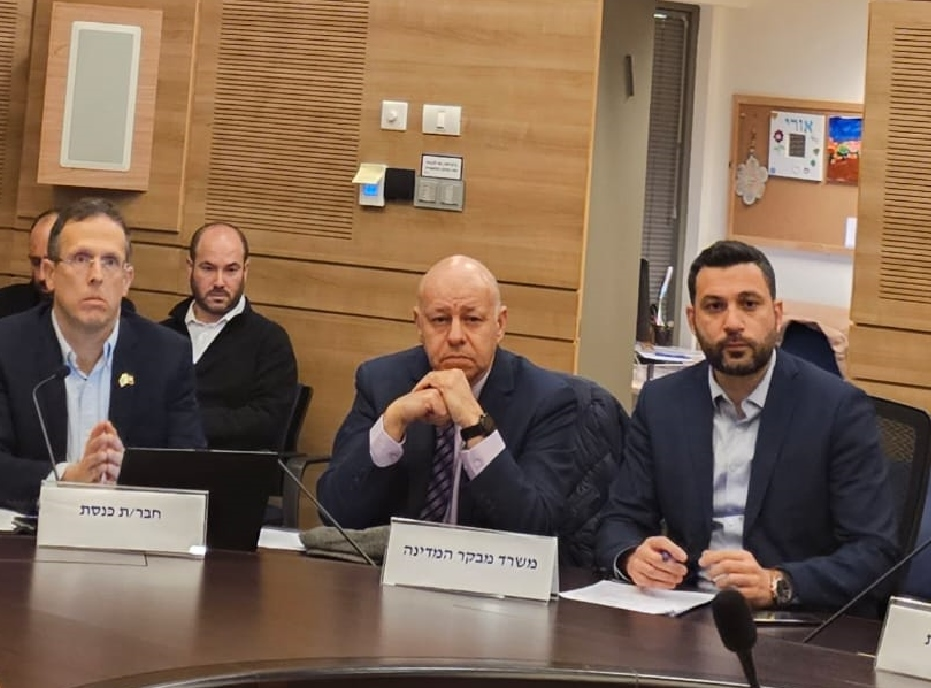In recent weeks, the Knesset members discussed a variety of topics which had been examined in the Comptroller's reports – from the approval process for building safe spaces, through preparedness for an earthquake and culminating in the government's actions to reduce vehicles' air pollution. The members of the State Audit Committee also discussed the handling of reserve duty soldiers – a topic that the State Comptroller and Ombudsman, Matanyahu Englman, announced he would examine within the framework of the war audit.
In January 2024 Comptroller Englman published a report, whose preparation had been completed before the war broke out, but which became even more relevant following the massacre on October 7th and the missile attacks on Israel. The report examined the topic of the approval of safe spaces by the Home Front Command and the control institutes as part of the process for granting a building permit. The Committee discussed (22.1.2024) this report, alongside the Comptroller's report from August 2020, on the topic of preparedness for defending the home front against missiles and rockets.
Eyal Sonnenfeld, Director of Department C in the Defense Forces Audit Division, said that the follow-up audit of preparedness for defending the home front had found substantive gaps in protection and sheltering: Among other things, it was found that as of the date of completion of the audit, approximately 2.6 million Israeli residents (about 28% of the population) did not have proper protection near their home, that the plans for evacuating the residents of Sderot and Kiryat Shmona had not been finalized – and that one fifth of the public shelters in Israel are not fit for use. "There are gaps which are liable to endanger the lives of the residents during a conflict", he emphasized.
Sonnenfeld and the Audit Director Yaakov Zimrat also presented the findings of the report on the topic of the safe spaces, which warned that their approval as part of the building permit process was progressing at a slow pace and not efficiently enough: Thus, while the number of approved applications for adding protection increased by 53% from 2019 to 2022 – the number of application inspectors at the Home Front Command had scarcely changed during the last decade. "Insofar as the process for the approval of a residential secure space is fast-tracked – the number of safe spaces will grow", Sonnenfeld noted.
"A big opportunity for change"
Last year the Comptroller also examined the government's actions to reduce vehicles' air pollution and the preparation for the transition to electric vehicles. Tzachi Saad, Director of the Economics and National Infrastructures Audit Division, presented to the Committee (23.1.2024) the main points of the report published in January 2024, together with the Director of Department B Marcelo Bez, his deputy Yaron Fishman, and the Audit Directors Bari Kossover and Tal Levi.
The report warned that the cost of air pollution on the roads had been estimated at approximately 7.2 billion shekels per annum. "Air pollution is the largest environmental mortality factor in Israel", said Saad. "Road traffic pollution is the main source of pollution in population centers, and it is extremely severe. One of the most significant factors for this pollution are trucks and busses, which although they constitute only 10% of the vehicle fleet – are responsible for 61% of the road pollution. This is something which must be dealt with". The Comptroller further found that there are only 219 fast-charging stations for about 40 thousand electric vehicles travelling on Israel's roads. Within this context, Saad emphasized that "The entry of electric vehicles is a very great opportunity for a structural change which will reduce the concentrations and introduce genuine competition into the vehicle industry".
The Committee requested the State Comptroller's opinion concerning the government's actions for preventing the dismissal of reserve duty soldiers and reducing harm to them. The Comptroller was represented at the discussion held on the matter (5.2.2024) by his senior advisor Yair Saban and the Legal Advisor Yoel Hadar. "We are currently examining many of the matters raised here", said Saban. "We shall examine the implementation of the financial aid plan for self-employed reserve duty soldiers, in particular the owners of small businesses; the National Insurance payments to those serving in the reserves; and the attitude of higher education institutions towards students who have been recruited in Swords of Iron. We also invite anyone who has been unfairly treated to contact us at the Office of the Ombudsman and file a complaint".
"A sever time lose"
For years the State Comptroller has been warning about the defects in the preparedness for an earthquake. An expanded follow-up report, which was published in January 2024, found that 18 years after the TAMA 38 plan was approved, it still has not achieved its objective: As of the end of 2021, only 3.5% of the buildings which were supposed to be reinforced were actually reinforced. 60% of the hospitals are not earthquake resistant – and only approximately 5% of the educational institutions have been reinforced.
The discussion of the report which was held at the Knesset (6.2.2024) was attended by representatives from the Economic Division: The Division Director Tzachi Saad, the Director of Department H David Bar, his deputy Nathan Shtibelman, as well as the Audit Directors Roee Fattal, Einat Adler Chen and Dan Menachem. "A powerful earthquake is only a matter of time. Even though among the four major threats to Israel the damage anticipated from an earthquake is the most severe, the investment in preparedness for an earthquake is the smallest", said Saad. "The six years which have passed since the previous report have been wasted. This loss of time is especially severe in view of the fact that earthquakes are an area which requires long term investment. Investment in the preparedness for an earthquake will lead not only to a reduction in casualties and human suffering – it is also financially effective. The follow-up report painted a very gloomy picture. A plan and a multi-year budget that will allow prolonged treatment are required".
Occasionally, the audit is capable of spurring the audited bodies into action by virtue of its very existence, even before the report's findings are published to the public. This was the case with the report that examined the supervision and control of the government companies: Even before the report was published in January 2024, the ministers accepted the State Comptroller's recommendation to withdraw from the government companies dividends worth NIS 2 billion, which had already been declared, in order to use them for the war expenses.
In the discussion held on this report at the Knesset (7.2.2024) Tzachi Saad, David Bar, the Deputy Department Director Yaakov Strauss, and the Audit Director Eli Marder, presented the main points of the findings: Approximately 50% of the companies and amutot (non-profit associations) under the supervision of the Government Companies Authority were acting without a Chairman of the Board during 2022, and approximately 44% of the positions in the boards of the companies had not been filled. It was further found that from 2018 to 2021 the government companies actually distributed only approximately 1.07 billion shekels as a dividend to the public.


Photograph: The Knesset Channel
